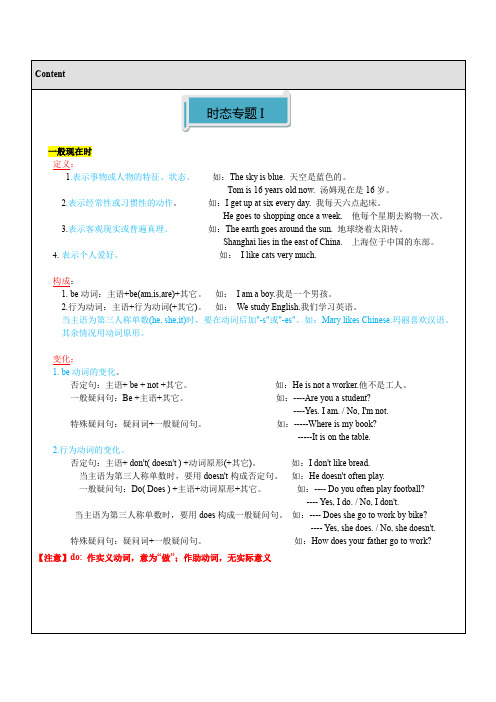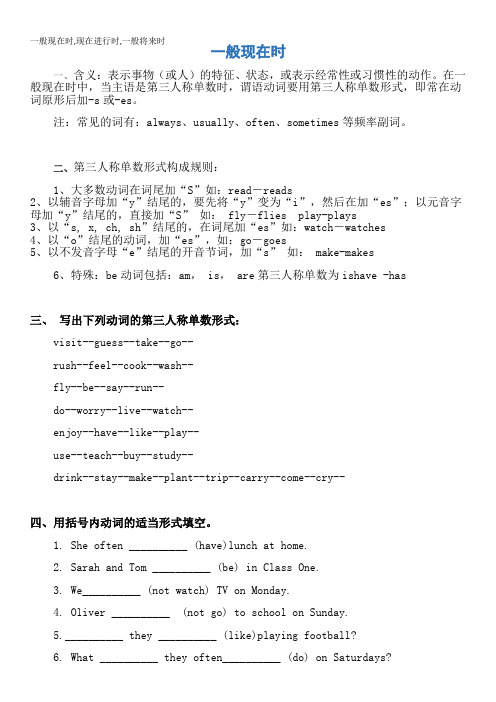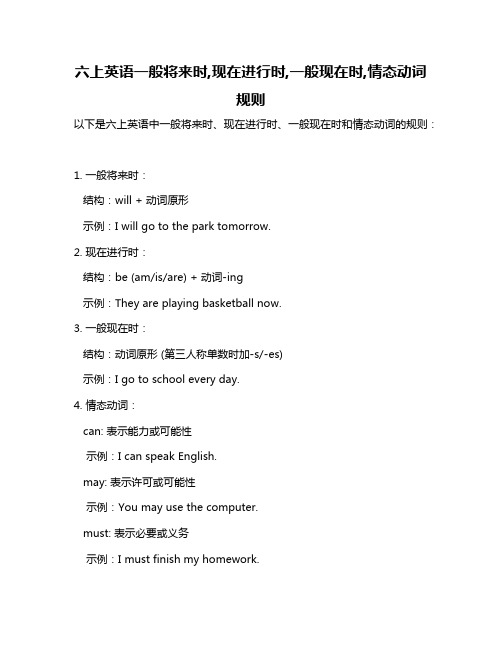一般将来时一般现在时现在进行时
初中语法专题讲解--一般现在时现在进行时一般将来时--学生版

Content时态专题I一般现在时定义:1.表示事物或人物的特征、状态。
如:The sky is blue. 天空是蓝色的。
Tom is 16 years old now. 汤姆现在是16岁。
2.表示经常性或习惯性的动作。
如:I get up at six every day. 我每天六点起床。
He goes to shopping once a week. 他每个星期去购物一次。
3.表示客观现实或普遍真理。
如:The earth goes around the sun. 地球绕着太阳转。
Shanghai lies in the east of China. 上海位于中国的东部。
4.表示个人爱好。
如:I like cats very much.构成:1. be动词:主语+be(am,is,are)+其它。
如:I am a boy.我是一个男孩。
2.行为动词:主语+行为动词(+其它)。
如:We study English.我们学习英语。
当主语为第三人称单数(he, she,it)时,要在动词后加"-s"或"-es"。
如:Mary likes Chinese.玛丽喜欢汉语。
其余情况用动词原形。
变化:1. be动词的变化。
否定句:主语+ be + not +其它。
如:He is not a worker.他不是工人。
一般疑问句:Be +主语+其它。
如:----Are you a student?----Yes. I am. / No, I'm not.特殊疑问句:疑问词+一般疑问句。
如:-----Where is my book?-----It is on the table.2.行为动词的变化。
否定句:主语+ don't( doesn't ) +动词原形(+其它)。
如:I don't like bread.当主语为第三人称单数时,要用doesn't构成否定句。
(完整版)一般现在时、一般过去时、一般将来时、现在进行时

初中语法一般现在时、一般过去时、一般将来时、现在进行时四种时态的区别名称定义时间动词形式时间词always、sometimes、usually、1、动词原形often、every表示经常性或习2、第三人称单一般现在时平时、经常惯性的动作数morning、动词后-s/esevery week、twice a week等等now、rightnow、表示此时此刻或at theam/is/are+动词现在进行时现阶段正在进行正在进行ingmoment、的动作look、listen等in the future、1、will/shall+动next词原形表示将来发生的week/month、一般将来时即将、计划2、am/is/are事tomorrow、+going to+动词in two weeks原形等等ago、yesterday、表示过去某一时1、V-ed(规则last week/候或某一段时间过去(与现动词)一般过去时night、所发生的事情或在无关的)2、不规则动词just now、存在的状态变化once upon atime等注意:1、一般现在时——第三人称单数的动词变化规则:1)大多数动词在词尾加“S”如:stop-______; make-______read-______; play-______2)以辅音字母加“y”结尾的,要先将“y”变为“i”,然后在加“es”如:fly-______;carry-______study-______; worry-______3)以“s, x, ch, sh”结尾的,在词尾加“es”如:teach-______;watch-______4)以“o”结尾的动词,加“es”如:go-______do-______2、现在进行时——动词ing形式的变化规则1.一般动词直接在词尾+ing例:read→______(读)talk→______(交谈)sing→______(唱歌)2.以不发音e结尾的动词,先去e再加ing例:like→______喜欢write→______写skate→______(滑冰)3.以重读闭音节结尾且末尾只有一个辅音字母的动词,双写末尾字母,再加ing例:stop→______(停止)get→______(得到)4.少数几个以ie结尾的动词,变ie为f再加ing。
表示将来的时态(一般现在时表将来,现进表将来以及一般将来时)

我相信,中国将会变成世界上最富有的国家之一。
There is going to be a heavy rain.
将会பைடு நூலகம்一场大雨。
②be going to和will均可表示“意图”:事先考虑过的意图用be going to;不是 事先考虑的意图即临时决定的用will。 I’m going to Qingdao this weekend. 这个周末我要去青岛。 —Sorry,I forgot to buy the book you need. ——对不起,我忘了去买你要的书了。 —It doesn’t matter. I will go myself. ——没关系。我自己去买就行了。
一般现在时
在时间和条件状语从句中可用一般现在时代替
一般将来时。 I’ll let you know as soon as I hear from him. 我一接到他的信就告诉你。
现在进行时
有些动词,如come, go, leave, return, arrive,
begin, start等,它们的现在进行时可表示不远 的将来要发生的事情。例如: Flight 1095 is landing soon. 第1095号航班马上要着陆了。
(
(
)5. Look! Some visitors __ for the bus over there. (2015南宁) A. are waiting B. is waiting C. waiting D. Wait
( (
) 6. ---What were you doing at 5:30 yesterday afternoon? --- I ______ with Sam.(2016 钦州) A. walk B. walks C. was walking D. walked )7. — What are you going to do tomorrow?(2014 柳州) — I ______ visit my aunt. A. went to B .go to C. am going to
一般现在时,现在进行时,一般将来时

一般现在时,现在进行时,一般将来时一般现在时一、含义:表示事物(或人)的特征、状态,或表示经常性或习惯性的动作。
在一般现在时中,当主语是第三人称单数时,谓语动词要用第三人称单数形式,即常在动词原形后加-s或-es。
注:常见的词有:always、usually、often、sometimes等频率副词。
二、第三人称单数形式构成规则:1、大多数动词在词尾加“S”如:read-reads2、以辅音字母加“y”结尾的,要先将“y”变为“i”,然后在加“es”;以元音字母加“y”结尾的,直接加“S” 如: fly-flies play-plays3、以“s, x, ch, sh”结尾的,在词尾加“es”如:watch-watches4、以“o”结尾的动词,加“es”,如:go-goes5、以不发音字母“e”结尾的开音节词,加“s” 如: make-makes6、特殊:be动词包括:am, is, are第三人称单数为ishave -has三、写出下列动词的第三人称单数形式:visit--guess--take--go--rush--feel--cook--wash--fly--be--say--run--do--worry--live--watch--enjoy--have--like--play--use--teach--buy--study--drink--stay--make--plant--trip--carry--come--cry--四、用括号内动词的适当形式填空。
1. She often __________ (have)lunch at home.2. Sarah and Tom __________ (be) in Class One.3. We__________ (not watch) TV on Monday.4. Oliver __________ (not go) to school on Sunday.5.__________ they __________ (like)playing football?6. What __________ they often__________ (do) on Saturdays?7. __________ your parents __________ (read) newspapers?8. The girl__________ (teach) us English on Sundays.9. She and I __________ (take) a walk together every evening.10. There __________ (be) some water in the bottle.11. Mike__________ (like) cooking.12. He__________ (have) two new books.13. My sister __________ (look) after her baby carefully.14. You always __________ (do) your homework well.15. I__________ (be) ill. I’m staying in bed.16. She __________ (go) to school from Monday to Friday.17. Liu Tao __________ (do) not like PE.18. The child often __________ (watch) TV in the evening.19. -What day __________(be) it today?-It’s Saturday20.-How__________Dad __________(feel)?-He __________(feel) not well.21.-Where__________ he __________(work)?-He __________(work) at sea.现在进行时一、含义:表示正在做某事。
一般现在时-现在进行时-一般将来时

1一般现在时( Present Simple)2。
现在进行时(Present Continuous)3. 将来的安排和打算( Future Arrangements and Intentions)一、一般现在时、现在进行时(一)、辨”个性”一般现在时表示经常性或习惯性的动作,以及主语的特征或状态。
1。
表示主语现在的状态或特征。
例如:I am a teacher.We have a very good relationship with our parents.2。
表示经常性或习惯性动作。
例如:My father goes to work by bike every day。
I always leave home for school at 6:303 。
表示自然现象,普遍真理,客观存在或科学事实。
例如:Shanghai lies in the east of China.The earth moves around the sun.现在进行时表示现在或现阶段正在进行的动作。
例如:1。
表示现在(指说话人说话时)正在发生的事情We are waiting for you at the moment。
2. 表示现阶段正在进行或发生的动作President Xi is visiting in the USA these days。
(二)、辨结构一般现在时的结构是:主 + 动词原形或动词的第三人称单数形式 +...。
.。
现在进行时的结构是: 主 + be(are/ is/am),动词的—ing形式+.。
...。
(三)、辨”信息词"一般现在时常和以下这些时间状语连用:always, often, usually=normally, sometimes=at times, regularly, seldom, never, hardly ever, from time to time, once a month, every day, on Sundays。
一般现在时、一般过去时、一般将来时、现在进行时句子结构

题目一般过去时,现在进行时,一般将来时,一般现在时的句子结构答案解析一、一般现在时结构:主语+ 谓语动词(实义动词或者是be动词)+ 宾语当主语是第三人称单数的时候,后面的谓语动词一定要变成动词的第三人称单数形式. 例:He has an English book.句子中的have 是动词原形,has则是have的第三人称单数形式二、现在进行时结构:be + v+ing + sthbe动词包括(am is are) 什么情况用哪个be动词是由主语决定的!当主语是第一人称“I ”的时候be 动词一定只可以用am当主语是单三的时候,be 动词要用is当主语是第二人称you 或者是其他的时候,be动词一定要用arev+ing 表示的是现在分词,也就是动词的ing 形式现在分词的变化形式:1.动词是以字母“e ”结尾的要去掉e 再+ ing2.直接在动词词尾+ing3.词尾是以一个元音字母加上一个辅音字母,且重读闭音节结尾的要双写辅音字母再+ing 例:play- playing take - takingdo - doing leave - leavingput - putting cut - cutting例:I am playing football with my classmates.He is watching TV at home.They are having an English class.三、一般将来时1.结构:be + going to +do sth例:I am going to do my homework tomorrow.He is going to babysit his sister.We are going to go shopping this weekend.2.will + v(原形)例:He will come back later.I will visit my grandparents next week.3.be + doing sth现在进行时也可以表示计划、打算要做的事情例:I am leaving for Shanghai next Sunday.四、一般过去时结构:主语+ 动词过去式(be 动词,或者实义动词) + 宾语例:I was a little girl 10 years ago.He went to the Great Wall last month.I visited my cousins last Saturday.。
六上英语一般将来时,现在进行时,一般现在时,情态动词规则

六上英语一般将来时,现在进行时,一般现在时,情态动词
规则
以下是六上英语中一般将来时、现在进行时、一般现在时和情态动词的规则:
1. 一般将来时:
结构:will + 动词原形
示例:I will go to the park tomorrow.
2. 现在进行时:
结构:be (am/is/are) + 动词-ing
示例:They are playing basketball now.
3. 一般现在时:
结构:动词原形 (第三人称单数时加-s/-es)
示例:I go to school every day.
4. 情态动词:
can: 表示能力或可能性
示例:I can speak English.
may: 表示许可或可能性
示例:You may use the computer.
must: 表示必要或义务
示例:I must finish my homework.
shall: 表示建议或命令
示例:You shall stay out of the garden.
will: 表示意愿或将来时间
示例:I will help you.
这些规则是英语语法中的基础部分,需要不断练习和巩固。
如需更多信息,建议查阅语法书籍或咨询英语教师。
一般现在时现在进行时一般将来时一般过去时知识点总结

一般现在时现在进行时一般将来时一般过去时知识点总结一般现在时、一般将来时、一般过去时、现在进行时知识总结一、一般现在时一般现在时表示经常性或惯性的动作,常与表示频度的时间状语连用,如often, usually, always, sometimes, never, seldom, every week/day/year/month...,once a week, on Sundays等。
动词用原形。
当主语为第三人称单数时(he, she, it,一个人名),动词变为三单形式。
Be动词肯定句主语+am/is/are+其它I am a boy.否定句一般疑问句Am/is/are+主语+其它Are you a boy? Yes, I am.No, I am not.Do+主语+动词原形+其它?Do you play basketball after school everyday? Yes, we do. / No, we don't.Does+主语+动词原形+其它。
Does he swim well ? Yes, he does. / No, XXX't.非凡疑问句疑问词(where/what/ when/who/why/how)+am/is/are+主语+别的Where are you?疑问词+do+主语+动词真相+别的?What do you do afterschool everyday?主语+am/is/arenot+别的I am not aXXX.第一人主语+动词原形(+主语+don't+行称I、第其它)。
We play动词原形(+其它)。
wedon’t为二人称basketball afteryou、XXX.playbasketball动复数after schoolXXX.词第三人主语+动词三单主语+称单数式(+别的)。
doesn’t+动词真相(+其XXX.它)。
XXX’tswim well.疑问词+does+主语+动词原形+其它。
- 1、下载文档前请自行甄别文档内容的完整性,平台不提供额外的编辑、内容补充、找答案等附加服务。
- 2、"仅部分预览"的文档,不可在线预览部分如存在完整性等问题,可反馈申请退款(可完整预览的文档不适用该条件!)。
- 3、如文档侵犯您的权益,请联系客服反馈,我们会尽快为您处理(人工客服工作时间:9:00-18:30)。
七年级下册英语M 3 –M 4 时态复习一般将来时讲解一、概念:表示将要发生的动作或存在的状态及打算、计划或准备做某事。
句中一般有以下时间状语:tomorrow, next day(week, month, year…),soon, the day after tomorrow(后天)等。
二、基本结构:①be going to + do;②will+ do.三、否定句:在be动词(am, is, are)后加not或will后加not成won’t.例如:I’m going to have a picnic this afternoon.→ I’m not going to have a picnic this afternoon.四、一般疑问句:be或will提到句首,some改为any, and改为or,第一二人称互换。
例如:We are going to go on an outing this weekend.→ Are you going to go on an outing this weekend?五、对划线部分提问。
一般情况,一般将来时的对划线部分有三种情况。
1. 问人:Who例如:I’m going to New York soon. →Who’s going to New York soon.2. 问干什么: What … do.例如:My father is going to watch a race with me this afternoon. →What is your father going to do with you this afternoon?3. 问什么时候:When.例如:She’s going to go to bed at nine. →When is she going to bed?六、同义句:be going to = willI am going to go swimming tomorrow(明天). = I will go swimming tomorrow.七、be going to和will 的区别???be going to和will 的用法虽然都表示将来发生动作或情况,但它们的用法是有区别的:1. be going to主要用于:1)、表示事先经过考虑、安排好打算要做的事情。
E.g.What are you going to do today? 今天你们打算做什么?? I’m going to play the violin. 我打算拉小提琴。
2)、表示根据目前某种迹象判断,某事非常有可能发生。
E.g.Look! There come the dark clouds. It is going to rain. 瞧!乌云密集,天要下雨。
I am afraid I am going to have a cold. 恐怕我要患重感冒。
2. will主要用于在以下几个方面:1)、表示单纯的未来“将要”通用各个人称。
eg:They will go to visit the factory tomorrow. 明天他们将去工厂参观。
2)、表示不以人的意志为转移的自然发展的未来的事。
eg:Today is Saturday.?? Tomorrow will be Sunday.今天是星期六。
明天是(将)是星期日。
He will be thirty years old this time next year. 明年这个时候他就(将)三十岁。
3)、问对方是否愿意做某事或表示客气地邀请或命令。
eg:Will you please turn on the radio???? 请打开收音机好吗Will you go to the zoo with me???你和我一起去动物园好吗八. 趋向性动词下列动词: come, go, leave, arrive等词用一般现在时表示将来。
I am coming tomorrow. 我明天过来。
语法练习一.用所给单词的适当形式填空1.There ______(be) an American film next week.2.Tom _______(play) football with us tomorrow.3.Next week we ________(have) an English party.4. She begins________(do) her homework in the afternoon.5.In my dream school there won’t be ________(some) dirty classrooms.6.Tom ________(go) back to Australia in three days.7.The radio says it _______(rain) later on today.8. David ______________ (give) a puppet show next Monday.9. I ________________ (plan) for my study now.10. Today is a sunny day. We __________ (have) a picnic this afternoon.11. My brother _______________ (go) to Shanghai next week.12. Tom often ____________(go) to school on foot. But today is raining.He ______________ (go) to school by bike.13. What do you usually do at weekends?I usually __________ (watch) TV and __________(catch) insects.14. It’s Friday today. What ________she _________ (do) this weekend?She _________ (watch) TV and _________ (catch) insects.15. Mary ____________ (visit) her grandparents tomorrow.二.选择题( ) 1. The train ________ at 11.A. is going to arriveB. will be arriveC. is going toD. is arriving ( ) 2. Charlie ________ here next month.A. isn’t workingB. doesn’t workingC. isn’t going to workingD. won’t work ( ) 3. He ______ very busy this week, he ________ free next week.A. will be; isB. is; isC. will be; will beD. is; will be( ) 4. There ______ a dolphin show in the zoo tomorrow evening.A. wasB. is going to haveC. will haveD. is going to be ( ) 5. –______you ______free tomorrow? – No. I ____free the day after tomorrow.A. Are; going to; willB. Are; going to be; willC. Are; going to; will beD. Are; going to be; will be( ) 6. Mother ________ me a nice present on my next birthday.A. will givesB. will giveC. givesD. give( ) 7. ________ a concert next Saturday?A. There will beB. Will there beC. There can beD. There are( ) 8. He ________ to us as soon as he gets there.A. writesB. has writtenC. will writeD. wrote( )9. – Will his parents go to see the Terra Cotta Warriors tomorrow?– No, _______(不去).A. they willn’t.B. they won’t.C. they aren’t.D. they don’t.( )10.Tomorrow he ___a kite in the open air first, and then ____boating in the park.A. will fly; will goB. will fly; goesC. is going to fly; will goesD. flies; will go ( ) 11. He ________ there at ten tomorrow morning.A. willB. isC. will beD. Be( ) 12. ______your brother ______ a magazine from the library?A. Are; going to borrowB. Is; going to borrowC. Will; borrowsD. Are; going to borrows( )13. -----Will everyone study at home? -----Yes, _______will.A. everyoneB. itC. ID. they( )14. Li Ming is 10 years old now, next year he _____11.A. is?B. is going to be??C. will be??D. will to be( )15. We ________ home next Sunday.A. are going to goB.are goingC. are going toD. are going for◆七年级上英语时态复习一、?一般现在时:(1、现在的状态。
